Beth Kephart's Blog, page 166
September 1, 2012
bringing Quinn onto the Dr. Radway team
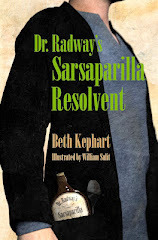
How do we ever get to be, in this life, to be the thing we want to be?
Sometimes somebody just has to give us a chance.
For as long as I have known Quinn Colter (we met shortly after I started this blog, when she was still in high school), she has wanted to be a copy editor. Words—the right words, rightly spaced and punctuated—matter to her. She studies them and celebrates them. Their mismanagement irks her. She sees herself in New York City someday, but between now and then—how? what?
Readers of this blog know how important copy editors are to me. Quinn knows how important she has become in my life. Not long ago I made the decision to invite Quinn onto the Dr. Radway's Sarsaparilla Resolvent team, and so I am so happy today to announce that she will be my copy editor on this important project.
Dr. Radway is due out next March from New City Community Press/Temple University Press.
Welcome to 1871 Philadelphia, Quinn.




Published on September 01, 2012 03:59
August 31, 2012
Handling the Truth: my multiple hats off to Mary Beth Constant, copy editor supreme
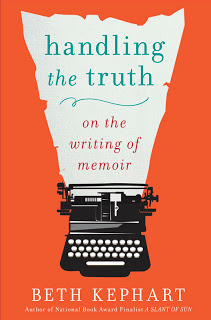
No writer can afford to go out there undressed, uncoiffed, unedited (like, for example, me on this blog, every day). With my books (where it really does matter, where all jokey grammar must be set to the side, where my I'll-check-it-later attitude must be checked at the door) I hold my breath each time I'm assigned a copy editor. Will she get me? Will she care? Will she forgive my inevitable slips? Will she make me better than I am? Is she even interested in the topic?
Yesterday I received notes from Mary Beth Constant, the copy editor who was assigned to Handling the Truth. Handling is filled to the margins with excerpted works, quotes, and Beth-isms. It's me, untamed, books I've loved, arguments I've decided to make.
Not everyone would want to take on such a task, I imagine, and how many people actually could? But Mary Beth is something else—sweeping in after me to check on each little excerpted line, offering her thoughts on British punctuation, regaling me with her own tales of favorite David Sedaris essays. Plus, she's funny. I want to throw my arms around this Mary Beth Constant today, but this blog is the only way that I know how. And so, Mary Beth, wherever you are, whatever you are doing on this Labor Day weekend, thank you. You have given me extra-extraordinary peace of mind. And I will hug you, if I find you.
(Please don't read this blog, though, on a regular basis. Its many inconsistencies and faults will trouble you, deeply.)




Published on August 31, 2012 08:01
August 30, 2012
pushing back

This is not the front door to my son's new apartment (which, if all goes according to a wobbly plan, we will move him into over the weekend), but it is the door that sits across the alley from my own former city home. It has the kind of character I look for in old things. It tells a story.
I'm going to push back from this desk for a few days here. There's that apartment move-in, referenced above, to take care of. There are the copyediting notes for Handling the Truth, just arrived. There's cleaning galore, banking, bills to pay. And if we don't get washed out entirely, I'll be seeing Bruce Springsteen at last on Monday night.
I need to see Bruce Monday night.
May the rain clouds spare us all, and may the drier weather come to those whose lives have been so deeply affected by Isaac.




Published on August 30, 2012 07:45
August 29, 2012
My thoughts on social media and etc. at Philadelphia Stories

Michelle Wittle invited me to share my thoughts about publishing, social media, and cake (well, I threw in the cake part) for her always-informational Philadelphia Stories blog. I have the great privilege of joining Michelle and others at the annual Philadelphia Stories Push to Publish conference, being held on October 13th at Rosemont College, and I was glad for this excuse to talk to Ms. Wittle again.
Michelle, you want a hug? You'll get one.
For the whole interview, go here. A first question answered, below.
Wittle: What do you find are the most helpful tools
for a writer in YA to market his or her book? Should they have a blog? A
twitter account? Maybe reach out to the local libraries and host a
writing and or reading session?
Kephart: I am afraid that I never really think about
tools or strategies. I think about who I want to be in the world—what
kind of community I want to live within. And so I blog as much to
exercise my own brain (made stagnant at times by too much corporate
work) as to exchange thoughts with readers and writers who inspire me. I
twitter very rarely, and usually it’s to have some comedic relief or to
spread word. I have a book party each time a book comes out at Radnor
Memorial Library with the great hostess Pamela Sedor because she is so
kind and because friends come (indeed, we are having a party for Small Damages on September 12 at 7:30 at Pam’s fabulous library, should any readers of this interview like to come; there will be cake!). Mostly, though, I try to participate in the greater literary community. I write for The New York Times Book Review, Chicago Tribune, Shelf Awareness, Philadelphia Inquirer, Publishing Perspectives, and
elsewhere on the state of books and culture and teens, or on places
that I love. And this, I think, keeps me in the mix more than anything.
[image error]




Published on August 29, 2012 06:13
August 28, 2012
prof pride in my student, Nabil Mehta

I do go on about these young people in my life, but they've more than earned me the right. They are my students, after all, and they are as talented and hope-affirming as they come. You'll get to read some of their best lines, in a year, in Handling the Truth. But between now and then, please join me in celebrating this full-length essay by my student, Nabil Mehta, published in the current issue of The Pennsylvania Gazette. Nabil is my second student to have his work featured in this beautiful magazine—the second to work with the tremendously thoughtful and talented Trey Popp, the magazine's associate editor. (To see Joe Polin's essay, go here.) Both Nabil and Joe are engineering students, by the way. Which just goes to show that no one—and no major—owns literary talent.
I share the beginning of Nabil's essay. The rest can be found here. This is work that began life in my classroom before being transformed for publication throughout the summer.
Though I enjoyed, as every proud Canadian must, the silent cold of
winter during my childhood in Toronto, it was the summer afternoons that
I secretly liked best. Maybe it was the nest of cardinals outside my
bedroom, singing a song that to this day puts me back in the same bed.
Or maybe it was the sun pouring through the second-floor skylight and
lighting up every carpet dust particle just so, or the afternoons
playing catch with my brother in the cul-de-sac, disrupted occasionally
to assure my mother that I hadn’t broken my arm in the last 15 minutes.
This day, though, was different. The mid-August sun had nothing to
illuminate but some carpet under-pad and a few boxes left in the
hallway. The bed in which I’d been serenaded had been removed, and the
cardinals’ chirps bounced around bare walls. We were moving, I had been
told a few months ago, to a place called Connecticut, in the United
States.
Isn’t that in Pittsburgh? I had asked.




Published on August 28, 2012 10:28
reading with the masses: Gone Girl/Gillian Flynn

I know you didn't particularly see this coming, but every now and then I do stop to read what everyone else seems to be reading (no, not Fifty Shades, never Fifty Shades). What is heating up the collective pulse? What is hiding behind the hot-edged covers of all those books?
Last week, while ordering a number of stuffy-sounding research tomes for a book I haven't yet written a word of, I slipped Gone Girl by Gillian Flynn into the mix. I've had a no-vacation (except for two shore days) summer. I'm under enormous work pressures. I've been reading books to analyze and review them. I wanted just to read.
And so: Gone Girl. Wicked smart, Porsche paced, suspensed (yes, I made up that word), and even if I smelled the plot twists long ahead of their pronouncements, I have had fun reading Flynn's meditation on young marriage (twisted young marriage), cinematically-pilfered-and-puffed life philosophies, and 21st century murder. Flynn is au courant. She nails unhappiness and spite, bewilderment and tainted nostalgia. She is a gorgeous woman who renders mouthy, one might argue rancid characters, and perpetually keeps you reading. I get why people love this book and don't love it in equal measure (surely the mark of a bestseller). I appreciate its intelligence, which is to say Flynn's. I take my hat off to its never-look-back, take all prisoners, affront all prisoners fiesty-ness. I would not know how to write a book like this one. I respect Flynn for not just knowing, but for doing.
Here Flynn is, smoking through what she believes many of us have become:
I can't recall a single amazing thing that I have seen firsthand that I didn't immediately reference to a movie or TV show. A xxxx commercial. You know the awful singsong of the blase: Seeeen it. I've literally seen it all, and the worst thing, the thing that makes me want to blow my brains out, is: the secondhand experience is always better. The image is crisper, the view is keener, the camera angle and the soundtrack manipulate my emotions in a way reality can't anymore. I don't know that we are actually human at this point, those of us who are like most of us, who grew up with TV and movies and now the Internet. If we are betrayed, we know the words to say; when a loved one dies, we know the words to say. If we want to play the stud or the smart-ass or the fool, we know the words to say. We are all working from the same dog-earred scripts.




Published on August 28, 2012 06:25
August 27, 2012
The Small Damages Launch Party: Radnor Memorial Library, September 12.

My books are never quite yet real books to me until I get to share them with Pamela Sedor of the Radnor Memorial Library and my own Main Line community. Pam brings cake. Pam (a knock-out international-class rower, by the way) orders punch. Pam dresses in high but somehow still understated fashion, shines like a star, gives me a hug, and I stand up there and read. I read from a book I have loved, a book I have inevitably struggled with, a book that I do want to share with my friends. This is my chance to share my book with my friends.
That book, this sweet season after summer, is Small Damages, a book that has been humbled by kindnesses from near and far (beginning with Tamra Tuller's yes, long ago, and fortified by Jessica Shoffel's care). For more about this book and the journey it has taken since its release on July 19th, please visit this dedicated Small Damages page.
So join us, if you can, on September 12, 7:30 PM, at the Radnor Memorial Library. The details are here, in this poster Pam and her team created.




Published on August 27, 2012 17:43
August 26, 2012
Handling the Truth: the cover reveal
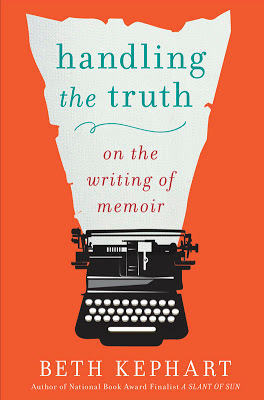
Last week, Lauren Marino, my Gotham editor, shared what I think is a most stunning cover for Handling the Truth,
which is due out from Gotham (Penguin USA) next August. To Lauren and
to Susan Barnes, who has answered so many questions along the way, my deepest
thanks. To Amy Rennert, who has cared so much about this work, thanks, too. This cover is sensational—a great blessing on a book that means so very much to me.
The catalog copy:
In the
tradition of Anne Lamott’s Bird by Bird,
a critically acclaimed National Book Award finalist shares inspiration and
practical advice for writing—and living with—memoir.
Writing memoir is a deeply personal, and consequential, undertaking. As the acclaimed author of five memoirs
spanning significant turning points in her life, Beth Kephart has been both
blessed and bruised by the genre. In Handling
the Truth, she thinks out loud about the form—on how it gets made, on what
it means to make it, on the searing language of truth, on the thin line between
remembering and imagining, and, finally, on the rights of memoirists. Drawing on proven writing lessons and classic examples, on
the work of her students and on her own memories of weather, landscape, color,
and love, Kephart probes the wrenching and essential questions that lie at the
heart of memoir. A beautifully written work in its own right, Handling the Truth opens Kephart’s memoir-making classroom—and
thoughts—to all those who read or seek to write the truth.
Kephart
is a very gifted and insightful writer.”— USA
Today
“[Kephart] writes eloquently.”—The
New York Times Book Review




Published on August 26, 2012 18:56
In today's Philadelphia Inquirer: remembering the Jersey Shore
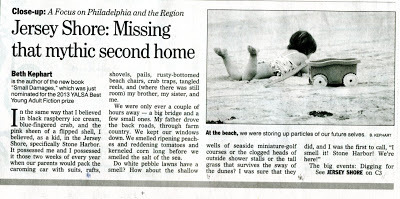
This past Monday, my son and I traveled to the Jersey Shore—Stone Harbor—to see my brother, his wife, and their two children. They've been renting a place there for a long time now, and barring unforeseen circumstances, I join them for a day each year. I took some photographs on Monday for an essay Avery Rome had invited me to write, and today I'm privileged to have the piece appear here, in the Currents section of the Philadelphia Inquirer.
I share the first paragraph of my remembrances of, and nostalgia for, Stone Harbor, below. But before I do, I'd like to share this—a photograph of my brother and sister, sand sculpture-ers supreme, taken years ago.
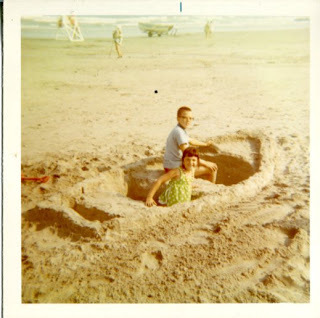
In the same way that I believed in black raspberry ice
cream, blue-fingered crab, and the pink sheen of a flipped shell, I believed,
as a kid, in the Jersey Shore, specifically Stone Harbor. It possessed me and I possessed it
those two weeks of every year when our parents would pack the caroming car with suits, rafts, shovels, pails, rusty-bottomed beach chairs, crab
traps, tangled reels, and (where there was still room) my brother, my sister,
and me.




Published on August 26, 2012 04:49
In the Chicago Tribune: Reviewing Enid Shomer's Twelve Rooms of the Nile

I had the privilege of reviewing Enid Shomer's glimmering Twelve Rooms of the Nile for this weekend's edition of Printer's Row (Chicago Tribune). From the opening of the review:
Enid Shomer makes beautiful sentences; she always has. As a poet and writer of short fiction
she has dazzled, forging unexpected liaisons between found details and arcane
history, simple living and extravagant loss. She knows a lot—about the world, about words. She forces readers (this one, anyway)
to crack the binding on the old two-volume Shorter Oxford. What does proleptic mean? How close
an alliance can intellect and jackdaw be said to have? And when is the last time you saw pentimenti used to describe the veins in
a keening woman’s temple?
Shomer keeps you on your toes, I’m saying, and with The Twelve Rooms of the Nile, her first
full-length novel, she has given herself the surely unexpected and inevitably complicated
task of pairing two nineteen century personalities—Gustave Flaubert and
Florence Nightingale—in a shared adventure up the Nile. History places the two in the same
vicinity at the same time, we learn from Shomer’s back-page notes. History does not make the claim,
however, that the despairing author and eventual Angel of the Crimea ever met
in that fated year of 1849; if anything, the two merely glimpsed each other in
passing. Shomer is interested in
what might have been, and she dedicates well over 400 pages to this intriguing
fancy.
Let’s talk about the imagery first. Let’s choose a word: magnificent. This is the Nile, this is Egypt, this is desert sun and
camel rhythms, Harem seduction and “spavined mules.” This is
what Enid Shomer does best. I’m a
river person, and have always conceived of my rivers as female, have always
called them “she.” Shomer makes me
almost believe in the Nile’s masculinity....




Published on August 26, 2012 04:22



